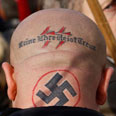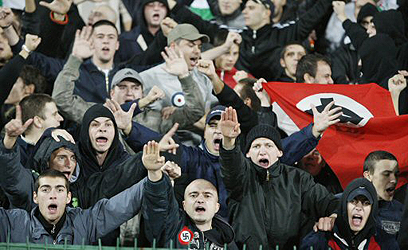
Both clubs have a distinguished history: Resovia is one of the oldest sports clubs in history, while Stal won the Polish championship in the mid 1970s. As in most derby matches worldwide, the rivalry is bitter and filled with hatred.
During the game, some of them waved a huge cloth banner carrying a cartoon showing a Jew with a curved nose, wearing a striped yarmulke in the meaningful colors of blue and white – the colors of the flag of Israel, the colors of prisoners' uniform in Auschwitz and the official colors of the rival camp. On the devout Jew's face they scribbled the international "no entrance" sign. A poster held next to the cartoon read, "Death to those with curved noses."
Although the Nazis massacred masses of Polish people, the anti-Semitic racism raging in the Polish soccer stadiums lacks any historic cognition. It is based on pure hatred.
The recent anti-Semitic incident in Rzeszów sparked a fervent response in Poland. After the incident was revealed to the media by organizations fighting anti-Semitism, the Polish Football Association decided to penalize Resovia with a ridiculous fine and close the fields to its fans for two months. A number of inciters were arrested by the police.
The club's chairman, former Justice Minister Aleksander Bentowski, referred to the incident as "outrageous," and the team released a late apology saying that "the Jews of Rzeszów were starved to death and executed in the Rzeszów Ghetto, which later turned into a concentration camp for the entire region. Some of the city's Jews were sent to the death camps, while the others were shot in nearby forests. 'Death to the Jews' calls in this place must be punished."
The 'Jewish' club
Before World War II, one-third of Rzeszów's residents were Jews. The city even had a name in Yiddish – "Reisha." Nearly all of the Rzeszów's Jews were murdered by the Nazis, and today there is no information on Jews residing in the city, all the more so on Jews playing with the Stal club.
Nonetheless, the club is considered "Jewish" by the fans of its rival club in the city – not only because of its symbol and its players' clothes, but simply because it's considered "the enemy."
Despite the anti-Semitic posters and slogans, the heads of the rival clubs and representatives of the Polish Football Association who were present at the match kept silent. After all, anti-Semitism is a life's routine in Polish soccer. In nearly every city, as well as among the First League clubs, there are "Jewish teams" which are despised by their rivals and are subject to shocking anti-Semitic propaganda.
Fans of certain teams, which absurdly refer to themselves as "Aryan," arrive at the games with a racist belief about the need to create a "white Poland." They wave Nazi flags and posters sending the Jews to the gas chambers.
Now, following the World Cup in South Africa, preparations have begun for the European Football Championship games scheduled to take place in two years in Poland and Ukraine for the very first time. But senior Polish government officials have voiced their concern that the wild racism of local soccer fans will prompt the European Football Association to punish their country and hold the desired championship in a different country. The situation in Ukraine is not much better.

Neo-Nazi fans. 'Jews to gas chambers' (Archive photo: Reuters)
In a report released about a month ago, the European Commission against Racism and Intolerance (ECRI) harshly criticized the slow progress made in the war against anti-Semitism in Poland, particularly in the soccer field.
"Anti-Semitism is tolerated in part of the political world and influential media," the report said. "Racism among soccer fans, involving serious insults to black players and crude references to the Holocaust, is a major problem which must be tackled by the authorities as well as by the Polish Football Association and soccer clubs."
The Cracovia soccer club in Krakow, which plays in Poland's First League, is traditionally considered a Jewish club, because it had opened its ranks to Jews before the war. Its rivals regularly voice anti-Semitic slogans during matches.
Two years ago, a police investigation was launched against Arkadiusz Mysona, one of the most popular soccer players in Poland, for wearing a shirt with anti-Semitic slogans after winning a league match with the ŁKS Łódź club.
Mysona quickly apologized for the act, claiming that at the end of the match, as the players removed and changed their shirts, a fan approached him and handed him the anti-Semitic shirt. Mysona said he did not check the shirt, and immediately took it off after his colleagues showed him the writing.
"Anti-Semitism in Polish soccer is a serious phenomenon, particularly in light of the fact that only a small number of Jews live in Poland," says Dr. Rafal Pankowski of the FARE (Football against Racism in Europe) organization. The organization was founded in 1999 by fans from across Europe, who decided to launch a war on the racism phenomenon.
"Anti-Semitism in soccer is not directed against the physical presence of Jews in the stadiums, as there are almost none, neither among the fans nor among the players. The incident in Rzeszów is not unusual or special in Polish soccer," stresses Pankowski, who also heads a center monitoring racism in soccer across Eastern Europe.
"There are people who treat it lightly and claim it is virtual anti-Semitism. We say that using the word 'Jew' against fans of a rival club is as anti-Semitic if there are no Jews in those clubs.
"Moreover, extreme right-wing organizations are very active in stadiums. They promote their ideology there and try to recruit new members. The most active movement is NOP (the National Rebirth of Poland) – a fascist organization which has been trying to influence the soccer culture for years."
Pankowski notes that anti-Semitism in Poland is not restricted to the soccer world, but that in the soccer arena it is very clear.
"Soccer evokes emotions in a very special way," he explains. "It's related to the issue of personal and national identity, the element of the team and the masses, and these are used as emotion evokers.
"For a long time, the main problem was the tolerance expressed by the Polish clubs and sports institutions towards this phenomenon. Only recently they began changing their attitude for the better, partially thanks to our work. But the situation could be better. We provide the clubs with training and instruction programs and provide them with information on neo-Nazis and anti-Semitic and racist symbols seen inside the stadiums."
Beginning of a change?
As part of the war on racism and anti-Semitism in Polish soccer, Pankowski and his colleagues recently inaugurated a wandering exhibition about the multi-cultural roots of Polish soccer.
The exhibition reveals that many of the founders of Polish soccer and those who contributed to it in the first half of the 20th century were members of minority groups, mainly Jews. The different leagues had Jewish clubs, as well as Jewish actors, coaches and managers.
Józef Klotz made history when he scored the first goal for the Polish team against Sweden in 1924. He was murdered by the Nazis in 1941, as was national team player and Cracovia Kraków star Leon Sperling and popular soccer player Zygmunt Steuermann, who played for the rival club in Krakow and later for Jewish club Hasmonea Lwów.
"Beyond anti-Semitism, there is also the phenomenon of racism against black footballers," clarifies Pankowski. "They began coming to Poland in the early 1990s, at the end of the Communist era. The Polish national team also has foreign players who acquired citizenship, like Roger Guerreiro from Brazil. There was a harsh racist response towards them, but because they are such good players, this resistance died down. And still, many of them face serious racism."
Do you believe the European Championship could be moved to a different country?
"The Union of European Football Associations is aware of the situation. This is the reason they support anti-racism campaigns among the fans. They take it very seriously.
"Some time ago we held a big European convention in Warsaw on racism in soccer. We chose Warsaw in order to convey a message on the importance of this matter in Poland. I don’t know if this racism will lead to the cancellation of the championship in Poland, but we must reduce the chance for racist and neo-Nazi incidents during the championship.
"The European Championship is a very big opportunity for us. The improvement achieved so far is insignificant and not quick enough. We cannot eliminate the anti-Semitism phenomena completely before the Championship, but the state and society must do their utmost to improve the situation."
Dr. Maciej Kozłowski, a former Polish ambassador to Israel who serves today as head of a department in the Foreign Ministry in Warsaw involved in nurturing the ties with Israel and the Jewish people, agrees with Pankowski.
"Ahead of the Euro 2012, we cannot tolerate racism on our football fields," he says. "The European Association is extremely tough on this matter. In general, anti-Semitism among the young generations in Poland is less common than among the older generations, but there are cells of violent anti-Semitism among young soccer fans. It's a serious problem. There are clubs which are tolerant of this phenomenon."
In Krakow, even before World War I, there were two clubs – Wisla didn't take in Jews, while Cracovia did.
"Before World War II, the great wave of anti-Semitism in Poland sparked a debate on boycotting the Jewish sports clubs," says Dr. Kozlowski. "Cracovia objected. A similar situation took place in Lodz. And then they began treating those clubs as 'Jewish' clubs.
"There are fans who hold signs in the fields reading, 'White empire,' 'Jew hunters,' 'Jews to the gas chambers.' They are a minority, but a dangerous one. I'm encouraged by the large number of organizations fighting this phenomenon."
Following the serious incident in Rzeszów, the Polish foreign minister appealed to the country's new attorney general and asked him to look into the possibility of launching criminal proceedings against fans describing themselves as "Aryan" for supporting the Nazi ideology.
"The war on anti-Semitism," Kozlowski stresses, "is long and hard. A significant breakthrough can take place through the church, which is capable of playing a decisive role in this matter thanks to its history and public importance in Poland.
"This year we managed to convince the church in Krakow to include in seminars for young priests courses about Judaism and the relations between the Jews and the Polish people. It's the beginning of a change."
- Follow Ynetnews on Facbeook















